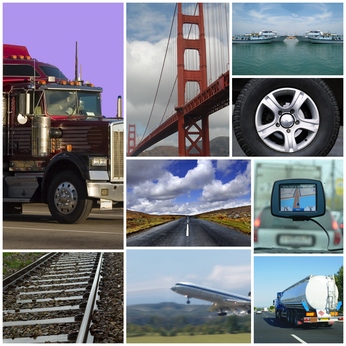There are 11 transportation service offerings.
Last summer, Inbound Logistics published a list of different 3PLs and their services. The article listed 11 different types of transportation services and I decided to write an overview of those 11 transportation service offerings described in the article.
I wrote a similar overview for warehousing: The 7 Warehouse Service Offerings
Transportation Service Offering 1 – Small Package
Package delivery or parcel delivery is the shipping of packages (parcels) or high value mail as single shipments. While the service is provided by most postal systems, private package delivery services have also existed in competition with and in place of public postal services.
Transportation Service Offering 2 – Air Cargo
Air transportation is used to transport air cargo by plane. Air cargo or air transport is a vital component of many international logistics networks. Air transport is a vital part of international commerce. Air transport involves integration of information, transportation, inventory, warehousing, material handling, and packaging. Transporting goods to and from the airport is also an essential part of the process.
Transportation Service Offering 3 – Ocean
Ocean transport is used to move goods across the ocean or larger lakes. There are many different types of cargo that are moved in various types of ships. The ships types include: bulk carriers, container ships, tankers, refrigerated ships and roll on / roll off ships.
Bulk carriers are cargo ships used to move bulk cargo like coal, ore, grains and liquids. Bulk cargo is commodity cargo that is transported unpackaged in large quantities. It refers to material in either liquid or granular, particulate form, as a mass of relatively small solids, such as petroleum, grain, coal, or gravel. This cargo is usually dropped or poured, with a spout or shovel bucket, into a bulk carrier ship’s hold, railroad car, or tanker truck/trailer/semi-trailer body.
Container ships are cargo ships that carry their entire load in truck-size containers, in a technique called containerization. They form a common means of commercial intermodal freight transport. Informally known as “box boats,” they carry the majority of the world’s dry cargo.
Tankers are cargo ships for the transport of fluids, such as crude oil, petroleum products, liquefied petroleum gas, liquefied natural gas and chemicals, also vegetable oils, wine and other food.
Refrigerated ships (reefers) are cargo ships used to transport temperature-controlled transportation, mostly fruits, meat, fish, vegetables, dairy products and other foodstuffs.
Roll-on/roll-off ships are cargo ships designed to carry wheeled cargo such as automobiles, trailers or railway carriages. RORO (or ro/ro) vessels have built-in ramps which allow the cargo to be efficiently “rolled on” and “rolled off” the vessel when in port.
A Multi-purpose ship (sometimes called a general cargo ship) is used to transport a variety of goods from bulk commodities to break bulk and heavy cargoes. To provide maximum trading flexibility they are usually geared and modern examples are fitted for the carriage of containers and grains.
Break bulk cargo or general cargo is a term that covers a great variety of goods that must be loaded individually, and not in intermodal containers nor in bulk as with oil or grain. Break bulk cargo is transported in bags, boxes, crates, drums, or barrels. Unit loads of items secured to a pallet or skid are also used.
More info about ocean transport from Wikipedia.
Transportation Service Offering 4 – Less Than Truckload
Less Than Truckload (LTL) is a shipment that does not require a full 48 or 53 foot trailer. There are many carriers that specialize or offer this service and like full truck load carriers the LTL carriers themselves specialize in different services such as lift gate and residential pick-ups and deliveries, guaranteed services, protect from freeze, transit, and bottom line cost to name a few.
Within a local area the LTL freight operator has a number of vehicles which collect shipments from their customers. After finishing the daily collection, the shipments are taken to a terminal where the vehicles are unloaded. Each shipment is weighed and rated which allows customer bills to be processed. The individual shipment is loaded on to an outbound vehicle which contains shipments from other customers bound for the same geographic area. The outbound shipments are trucked to appropriate regional terminals, where they are unloaded. The shipments are sorted and placed on local vehicles for delivery. Each individual shipment is handled a number of times from the time it is picked up from the customer until it reaches its final delivery location.
Transportation Service Offering 5 – Truckload
Truckload shipping is the movement of large amounts of similar freight, usually the amount necessary to fill an entire semi-trailer or intermodal container. A truckload carrier is a trucking company that generally contracts an entire trailer-load to a single customer.
Full truckload carriers normally pick up and deliver dedicated shipments. Typically, shipments are picked up at the shipper and delivered directly to the consignee. Truckload shipments are generally handled less, cost less per unit shipped and have less freight damage.
Transportation Service Offering 6 – Fleet Acquisition
Fleet acquisition services help companies acquire trucks. Fleet acquisition companies conduct an analysis of the client’s needs so they can acquire the right truck(s) for their clients.
To specify the truck fleet, the following information is considered: customization, driver requirements, market information, maintenance costs, financing options, taxes, etc. Other function may include: project management, inspection and delivery.
Generally, fleet acquisition services will be help their clients save money through market intelligence, volume pricing and close relationships to the OEMs.
Transportation Service Offering 7 – Equipment / Drivers
There are logistics companies that sell or lease transportation equipment to their clients. Transportation equipment is used to move material from one location to another, like between a loading dock and a storage area, etc…) within a facility or at a site. Typical equipment includes: conveyors, cranes, industrial trucks.
There are also logistics companies that provide temporary and / or fully-outsourced driver leasing services. These companies manage the driver workforce, enabling their clients to focus on their business. Driver leasing companies specialize in hiring, training, driver management, employee retention and benefits management.
Transportation Service Offering 8 – Dedicated Contract Carriage
Dedicated contract carriage is a third-party service that provides dedicated equipment (vehicles) and drivers to a single customer for its exclusive use on a contractual basis.
DCC is a flexible service that offers all the service advantages of a private fleet and the convenience of a for-hire carrier. DCC in a sense outsources many of the challenging functions associated with managing a fleet. Functions including, but not limited to ongoing operations management, technology, drivers, vehicles, vehicle maintenance, safety, regulatory compliance, risk management, and pickup and delivery instructions.
Transportation Service Offering 9 – Intermodal
Intermodal refers to transportation by more than one means of transport such as ship, truck and rail. The intermodal containerization of cargo has revolutionized the supply chain logistics industry. The reduced handling savings and efficiency has lowered shipping costs substantially.
Transportation Service Offering 10 – Final Mile
Final mile (last mile) describes the movement of goods from a transport hub to a final destination. Transporting goods via freight rail networks and container ships is often the most efficient and cost-effective manner of shipping. However, when goods arrive at a high-capacity freight station or port, they must then be transported to their final destination. The last mile problem can also include the challenge of making deliveries in urban areas where retail stores, restaurants, and other merchants in a central business district often contribute to congestion and safety problems.
Transportation Service Offering 11 – Rail
Rail transport utilizes freight trains to haul cargo. Sometimes, the freight cars are customized for a specific type of freight. Freight trains are very efficient, with economy of scale and good energy efficiency. However, pick-up and delivery to the rail head is costly and inconvenient.
With the growth of intermodal shipping, container trains has become the most important type of rail transport for non-bulk shipping. Containers can easily be moved to other modes of transportation like ships and trucks.
Rail is the most efficient mode for transporting bulk shipments like coal, ore, grains and liquids. Bulk is transported in open-topped cars, hopper cars and tank cars.
Questions: What do you think of the overview? What should be added to this transportation service offering overview?

